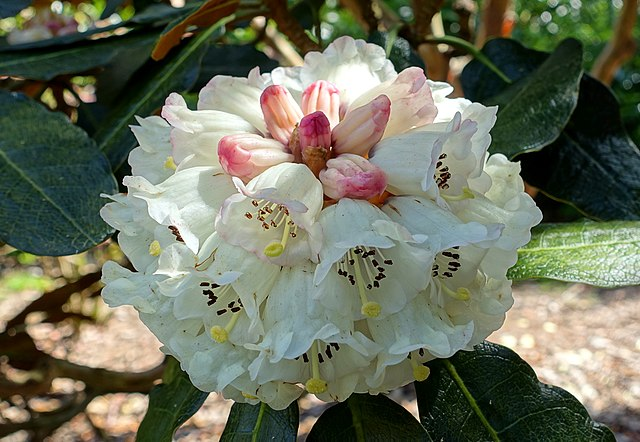Great Chinese Rhododendron
(Rhododendron sinogrande)
Great Chinese Rhododendron (Rhododendron sinogrande)
/
/

Daderot
CC0
Image By:
Daderot
Recorded By:
Copyright:
CC0
Copyright Notice:
Photo by: Daderot | License Type: CC0 | License URL: https://creativecommons.org/licenses/by-sa/4.0 | Uploader: Daderot | Publisher: Wikimedia Commons |



















Estimated Native Range
Summary
Rhododendron sinogrande, commonly known as the great Chinese rhododendron, is an evergreen shrub or small tree native to the coniferous and mixed forests of the Himalayas, including southeastern Xizang and western Yunnan in China, as well as northeastern Myanmar. It thrives at high altitudes ranging from 6890 to 11811 feet. This species can reach up to 33 feet in height and is noted for its large, dark green leaves, which can grow up to 20 inches long, making it one of the most impressive members of the genus. In late spring, it produces magnificent trusses of pale yellow or cream flowers, each spotted with maroon, which are highly valued for their size and beauty.
The great Chinese rhododendron is celebrated for its large, showy blooms and has earned the Royal Horticultural Society’s Award of Garden Merit. It is best suited for cultivation in cool, temperate regions and requires a sheltered location with dappled shade. The plant prefers acidic soil that is well-drained and enriched with leaf mold. Regular watering is necessary, especially during dry periods, to maintain its lush foliage and support its flowering potential. While it is generally disease-resistant, it can be susceptible to pests such as vine weevils and diseases like powdery mildew if not properly cared for. In cultivation, it is often used as a specimen plant in woodland gardens or as part of a rhododendron collection.CC BY-SA 4.0
The great Chinese rhododendron is celebrated for its large, showy blooms and has earned the Royal Horticultural Society’s Award of Garden Merit. It is best suited for cultivation in cool, temperate regions and requires a sheltered location with dappled shade. The plant prefers acidic soil that is well-drained and enriched with leaf mold. Regular watering is necessary, especially during dry periods, to maintain its lush foliage and support its flowering potential. While it is generally disease-resistant, it can be susceptible to pests such as vine weevils and diseases like powdery mildew if not properly cared for. In cultivation, it is often used as a specimen plant in woodland gardens or as part of a rhododendron collection.CC BY-SA 4.0
Plant Description
- Plant Type: Shrub
- Height: 25-50 feet
- Width: 15-30 feet
- Growth Rate: Moderate
- Flower Color: Cream, White
- Flowering Season: Spring
- Leaf Retention: Evergreen
Growth Requirements
- Sun: Full Sun, Part Shade
- Water: Medium
- Drainage: Medium
Common Uses
Bee Garden, Bird Garden, Border Plant, Hummingbird Garden, Showy Flowers
Natural Habitat
Coniferous and mixed forests of the Himalayas at high altitudes
Other Names
Common Names: Great Rhododendron
Scientific Names: , Rhododendron sinogrande, Rhododendron sinogrande var. boreale,
GBIF Accepted Name: